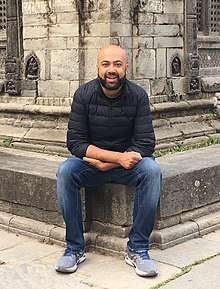Prajwal Parajuly
Prajwal Parajuly (né Sharma) (born 24 October 1984) is an Indian author whose works focus on Nepali-speaking people and their culture. Parajuly's works include the short-story collection The Gurkha's Daughter and novel Land Where I Flee.
Prajwal Parajuly | |
|---|---|
 | |
| Born | 24 October 1984 (age 35) Gangtok, Sikkim, India |
| Nationality | Indian |
| Education | Kellogg College, Oxford |
| Occupation | Author |
| Known for | The Gurkha's Daughter: Stories, Land Where I Flee |
Early life
Parajuly grew up in the Gangtok, Sikkim region of northeastern India. His father is Indian and his mother Nepalese.[1] He was educated at Truman State University in Kirksville, Missouri, and the University of Oxford.[2] Before committing to a writing career, he worked as an advertising executive at The Village Voice.[3]
Career
In September 2011, Parajuly became the youngest Indian author to be offered a two-book, multi-country deal. He was signed by Quercus.[3] He published his first book in 2012: a short story collection with the title The Gurkha's Daughter: Stories.[4] Describing and dramatizing the experiences of the Nepalese people and the Nepalese diaspora, his debut book was shortlisted for the 2013 Dylan Thomas Prize[5] and longlisted for The Story Prize that same year. Parajuly's second book, the novel Land Where I Flee, came out in 2013.[6] It was an Independent on Sunday book of the year and a Kansas City Star best book of 2015. He was the first writer-in-residence at The Oxford Centre for Hindu Studies in 2013. In 2016, Prajwal Parajuly was invited to be a judge for the Dylan Thomas Prize.[7]
Prajwal Parajuly has written for The New York Times, The Guardian, the New Statesman and the BBC.[8]
Works
- The Gurkha's Daughter, short story collection, released in December 2012.
- Land Where I Flee, novel, released in December 2013.
References
- "Truman grad sharing book deal experience with community". The Kirksville Daily Express. 2012-04-17. Retrieved 2012-04-18.
- "Prajwal Parajuly: 'Land Where I Flee' is, in many ways, an uncomfortable novel". Kitaab. 2013-11-30. Retrieved 2013-11-30.
- "Prajwal Parajuly: The Gurkha's son". LiveMint. 2014-01-02. Retrieved 2014-04-02.
- John Garth (2013-01-25). "The Gurkha's daughter by Prajwal Parajuly - review". The Guardian. Retrieved 2014-04-02.
- "Dylan Thomas Prize Shortlist 2013 Announced" Archived 2014-03-26 at the Wayback Machine, Swansea University
- Manjula Narayan (2013-12-21). "Book review: Land Where I Flee". Hindustan Times. Retrieved 2014-04-02.
- Cain, Sian (10 May 2017). "Dylan Thomas prize goes to Australian 'genius' Fiona McFarlane". The Guardian.
- "Alumnus Prajwal Parajuly invited to judge the International Dylan Thomas Prize 2017". Kellogg College. 2016-11-07. Retrieved 2018-07-20.